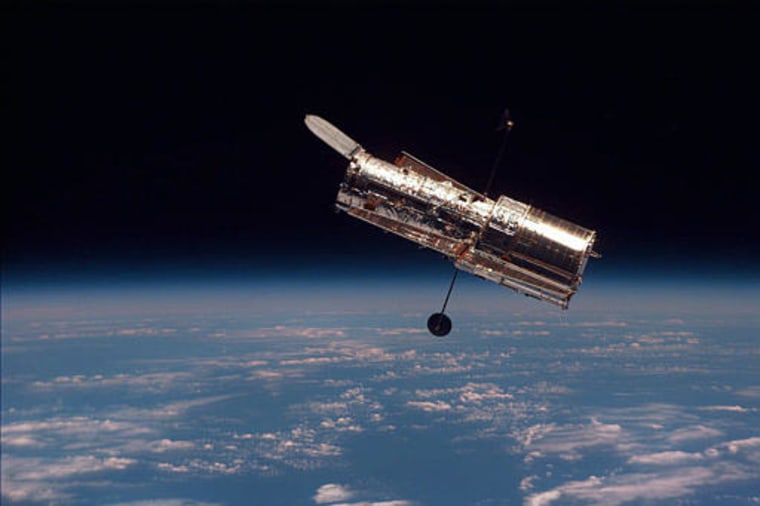The operators of the Hubble Space Telescope are being bombarded by suggestions from the public on how to save the craft — which NASA has decided not to service anymore — and say they are considering all offers.
Of the hundreds of e-mails, about a quarter ask, "Why can't the Russians help?"
Others suggest towing it to the space station for repairs, said Bruce Margon, associate director for science at the Space Telescope Science Institute, which operates Hubble for NASA.
"They are enormously concerned, they are perplexed, they are angry," Margon said. "They ask 'What percentage of the NASA budget is this?' And we tell them it's about 1 percent."
The Baltimore-based institute will set up a Web site to take suggestions from the public, he said. Another Web site, SavetheHubble.org, has been set up as part of a privately organized petition drive.
Servicing mission canceled
The suggestions started arriving after NASA said last week it won't send the space shuttle in 2006 to service the Hubble, a mission considered essential to enable the orbiting telescope to continue operating until 2010 or so. The Hubble has revolutionized the study of astronomy with its striking images of the universe.
Instead, NASA will focus on President Bush's plans to send humans to the moon and Mars. Virtually all remaining missions of the shuttle, which also is being phased out, will be used to complete construction of the international space station.
The decision to cancel the servicing mission has more to do with safety concerns than Bush's new space initiative. Under guidelines put into place after last February's Columbia tragedy, shuttle astronauts would have to be able to reach a safe haven if a problem developed aboard the spacecraft that would rule out atmospheric re-entry and landing. If the shuttle's orbital destination is the space station, the astronauts could wait there until a rescue mission is launched. But if the shuttle is servicing Hubble, it couldn't travel to the station, because the station takes a much different path around Earth.
Under the revised scenario for a Hubble servicing mission, NASA says it would have to have a second shuttle ready for launch in case something went wrong on the first shuttle. The agency's administrator, Sean O'Keefe, decided that such a scenario wouldn't be worth the risk and the expense, officials said last week.
Limited options
The fact that Hubble and the station are in such different orbits also explains why it's impractical to try towing the telescope to the station for repairs. Even if the Hubble could be moved into that orbit, it is not clear whether the space telescope could work because of drag from the small amount of the Earth's atmosphere present at that altitude, Margon said.
However, Margon didn't rule out the idea of asking the Russians for help.
Sen. Barbara Mikulski, D-Md., the ranking minority member of the Senate Appropriations subcommittee that oversees NASA's budget, said in a letter to O'Keefe last week that she was shocked by the decision given the Hubble's extraordinary contributions to science.
"I ask you to reconsider your decision and appoint an independent panel of outside experts to fully review and assess all of the issues surrounding another Hubble servicing mission," Mikulski said.
The 2006 mission was to have been the fifth and final mission to the space telescope before its planned retirement in 2010. The Hubble will eventually fall out of orbit and crash to Earth, probably in 2011 or 2012.
"We feel that we should consider every conceivable idea to get back the last four to six years of discovery that Hubble was on the brink of making," Margon said.
NASA does eventually plan one final mission to Hubble — involving the launch of an as-yet-undesigned unmanned rocket that will guide the space telescope back toward Earth for a fiery crash into the Pacific. NASA originally planned to use the shuttle to retrieve Hubble and display it at the Smithsonian — but that idea was scrapped.
"That's part of the heartbreak, something is going to have to visit Hubble anyway," Margon said.
